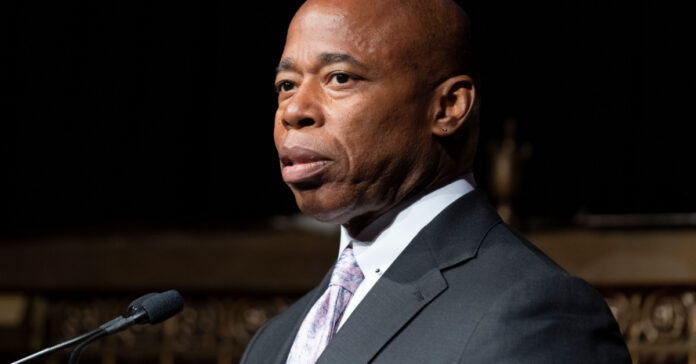
In a shocking expose, an audit has brought to light the burdensome costs borne by hardworking New York taxpayers, reaching into the millions, all thanks to the no-bid contracts handed out under emergency powers to tackle the dire illegal immigration situation. The report, hot off the press from the NYC Comptroller’s Office on Feb. 27, lays bare the reality of Mayor Eric Adams’s administration doling out non-competitive contracts to profit-driven entities, leading to inflated charges for services rendered to undocumented immigrants. Way to go, fiscal responsibility!
City Comptroller Brad Lander emphasized that these emergency contracts led to vendors charging “exorbitant rates” for staffing shelters, causing taxpayers to bear costs that could have been significantly lower with a more cost-effective approach. Lander stated that city agencies likely overspent “millions of dollars more than necessary,” urging City Hall to demand competitive prices from its contractors to keep costs in check.
The surge in illegal immigrants prompted Mayor Adams to declare a state of emergency in October 2022, rapidly expanding shelter operations under New York’s right-to-shelter laws. Over 210 shelters and facilities were established to provide temporary housing, with outside vendors enlisted for services like meals, medical care, and site staffing.
The audit revealed that around 340 contracts, totaling approximately $5.7 billion, were in place as of November 2023, with the majority procured on an emergency basis. Emergency procurements, exempt from competitive bidding, facilitate quick vendor sourcing but result in less oversight and higher costs, burdening taxpayers further.
The audit report criticized the city’s allowance for for-profit companies to exploit the emergency, noting “exorbitant rates” for work typically procured at more reasonable prices. The audit found significant disparities in pay rates for supervisors and security staff at various shelters despite providing identical services.
For instance, private security guards were paid between $50 and $117 per hour in the four highest-cost contracts, far exceeding the prevailing wage rate of $27.58 an hour. The audit suggests that the city could have saved approximately $50 million annually by utilizing its existing organizational structure and civil service jobs rather than resorting to financially wasteful emergency procurements.
Comptroller Lander emphasized the consequences of the city’s “haphazard approach” to these contracts and its failure to compare or control prices, highlighting the pitfalls of inadequate emergency procurement management.
In response to the audit, Mayor Adams, speaking at a Feb. 26 community event, acknowledged the high cost of handling 177,000 illegal immigrants and asylum-seekers, citing a staggering $12 billion migrant cost. The situation underscores the urgency for a more prudent and cost-effective approach to emergency procurements as taxpayers grapple with the financial ramifications of these questionable contracts.
In a financial disclosure, it has been revealed that New York City incurred approximately $1.45 billion in expenses related to the illegal immigration crisis during the fiscal year 2023, with projections indicating an upcoming expenditure of nearly $11 billion over the next two years. This revelation comes when the city grapples with a multifaceted challenge, forcing Mayor Adams’s administration to implement drastic cost-cutting measures.
Mayor Adams’s office, in November, introduced a fiscal year 2024 financial plan featuring a cost-cutting initiative known as the “program to eliminate the gap” (PEG). The PEG imposed a 5 percent across-the-board cut, impacting every city agency and sacrificing services in crucial areas such as education and policing to balance the budget.
Further cuts were anticipated in a PEG for fiscal year 2025; however, on Feb. 21, Mayor Adams announced the cancellation of these reductions. This decision was attributed, in part, to unexpectedly higher tax revenue and reductions in spending on asylum seekers.
Mayor Adams outlined plans to cut an additional 10 percent in budgeted city-funded spending on illegal immigrants, building upon a prior 20 percent reduction in the preliminary budget that already saved $1.7 billion. In a statement, he credited the city’s tough financial management decisions, including substantial cuts to asylum seeker spending, coupled with a better-than-expected economic performance in 2023, for allowing the cancellation of the last round of spending cuts. This also facilitated the lifting of near-total freezes on city hiring and non-personnel spending.
Despite this reprieve, Mayor Adams cautioned that challenges persist, emphasizing the need for support from Albany and Washington, D.C. He acknowledged that while progress has been made, the city is still in the financial woods.
Mayor Adams has been vocal in criticizing the Biden administration for its perceived failure to provide sufficient assistance in managing the illegal immigration crisis. On Feb. 27, he stated that, of the approximately 180,000 illegal immigrants provided with care, approximately 65,000 are still under the city’s watch. This ongoing burden highlights the urgency for collaborative efforts from higher levels of government to address the financial strain and ensure the well-being of New Yorkers.







